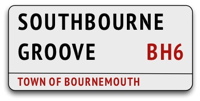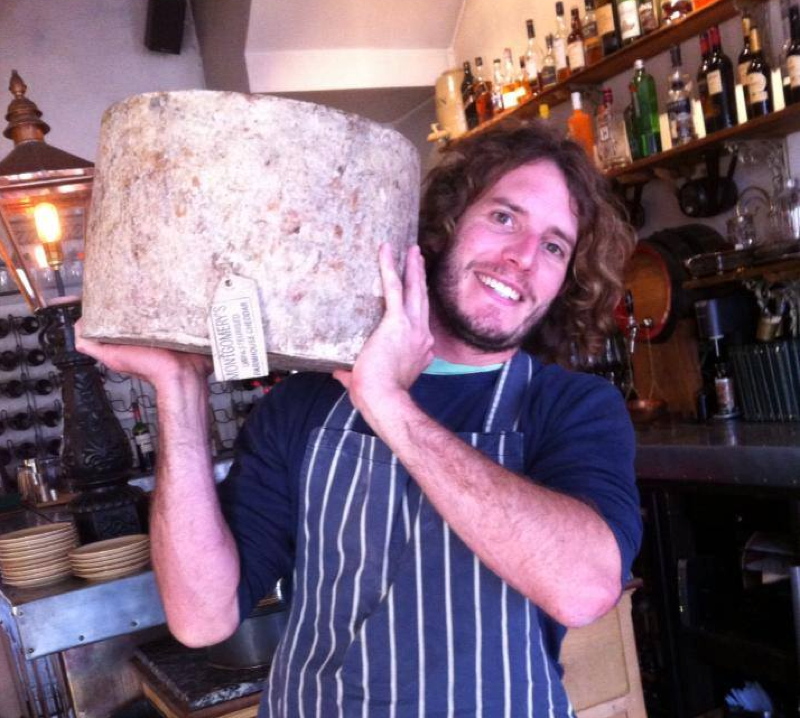Where there’s a wheel, there’s a whey.
As James’ new venture, a shop called Parlourmentary, is on the verge of opening, we took the opportunity to conduct the most comprehensive interview with him, to discuss how his love for food and drink turned into the Larder House, and how his love for Southbourne has turned in several distinct businesses that add to the diverse character of the high street.
The interview got delayed a bit, so this is 5 cocktails into the night thanks to James’ hospitality! So, if it sounds a bit rambling at times, that’s because that’s how we roll.
Gordon: So when did the James Fowler story begin? Where did the whole food and drink and flavours come from?
James: I learnt my food through my mom. Choosing to go to uni, I was either going to do marine biology or go to catering college and train to be a chef. I kind of followed the more scientific route.
Gordon: Did this develop at school, through holidays?
James: Just my mom always cooking all the time and she’s always loved food and I kind of, I just really enjoyed it. Big person that inspired me was Jamie Oliver. He was kind of like ripe on TV as I was like a developing teenager and just his excitement with food and I thought it’s really cool.
Gordon: What was it about Jamie Oliver, was it that kind of laddishness, that kind of banter?
James: It was that free spirit and like really engaging tables and your guests, and to really make it a really nice environment. And really knowing his produce. He talks so well about what he serves and how simple it actually is, if you are putting good food on the table. I was always sat at school, at the back reading my Jamie Oliver cookbooks getting told off by teachers when I should be actually studying.
Gordon: Were you inspired by holidays and the food you found there?
James: Yeah, we travelled a lot around France and Europe and things. Not really outside of there. Always kind of trying new things. I mean, as a teenager I didn’t, I wasn’t that…
Gordon: You weren’t drinking two litre bottles of cider?
James: No, no, I wasn’t. I always hated the cheese counter in the big shops and I wasn’t too fussed on certain foods. But then it sounds daft, but I’ve got a nut allergy.
When I found that out and the foods I couldn’t eat, I really started looking into what I couldn’t eat I think that kind of inspired me to learn more about dishes, which you can or can’t eat. I think in a weird way drove me to know more about food, because of the foods that I can’t eat. A strange way round, but that combined with my mom’s passion for cooking. She’s a massive Delia Smith fan, you know, Christmas dinners and Sunday roasts, kind of untouchable.
My mom still does the best ones for sure. But that’s where I really learned it from.
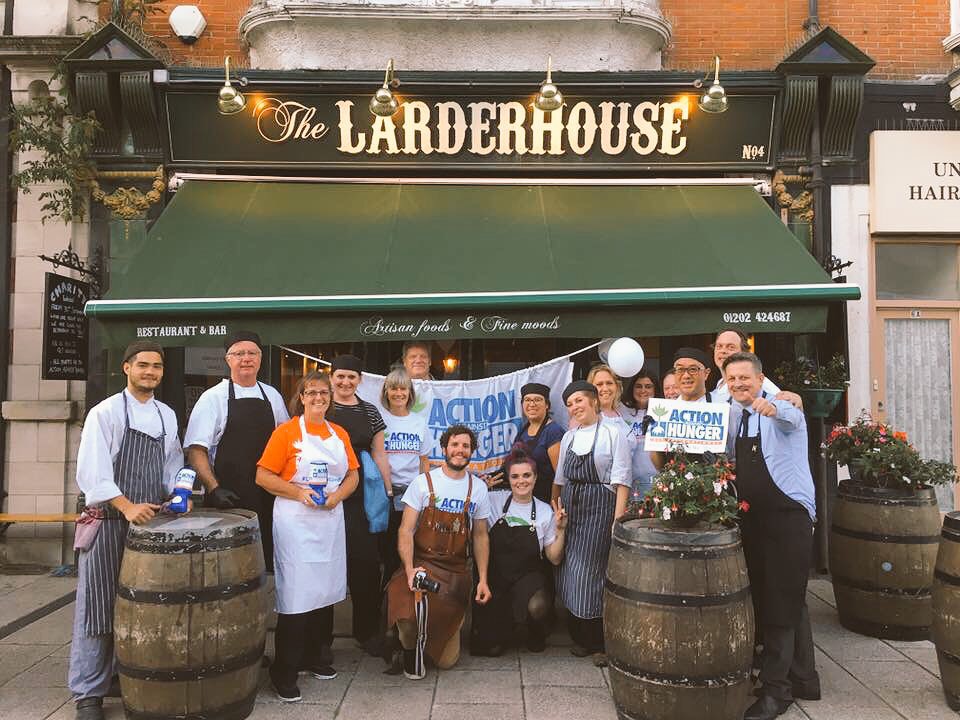
Gordon: What was your first job then?
James: At sixth form I was going around friends’ houses, cooking dinners for them and their families. I’ll take over the kitchen for the afternoon and just, just basically play with the Jamie Oliver cookbooks and just kind of learn. That’s how I already started really. Making your own pastas and following everything he did.
As soon as I hit uni, I spent my first student loan on cooking equipment. Kids in my student halls looked at me like I was a bit strange because I had so much kitchen equipment.
Gordon: Where did you go? What did you study?
James: Bangor, North Wales. I studied marine biology. That’s another side of things I was really interested in. Always being interested in the ocean and I kind of followed that through. So I did Uni there but I spent most of the time actually running cocktail bars and cooking.
Gordon: So that’s where the drink and the food came about?
James: Yeah. There was a stage in one of the Jamie Oliver books where he starts introducing drinks. He did a few recipes with Dick Bradsell, who invented the Espresso Martini. Then I started understanding the importance of food and drink, at the same time and how important a drink is within the food experience and dining.
There’s a lot of Michelin starred places I’ve been to that focus so heavy on the food that their backbars are awful, and their drinks and their cocktails are awful. That’s probably been my biggest drive is making the two of them as important as each other – because it’s symbiotic, it should be.
Gordon: So what was your first job then?
James: First job? Paper rounds and just working in a local pub. I’ve always kind of worked in the industry. I like to explore as much as I could within your local pub in Dorset.
Gordon: The Urban Beach, when did that come about?
James: Urban Beach came after Uni. So after university I went traveling for a little bit, for three months to Costa Rica and saw how people benefit from being fresh fruit all the time and being surrounded by it. Back then I must’ve been 2009, 2010 I came back to Bournemouth beach and needed a job and I took a job as a deckchair attendant along the beach. Just saw how bad the food was on the beach.
Everything’s fried, branded soft drinks so I decided to pitch to the Five A Day initiative with the NHS. So I got endorsed by them, pitched to Bournemouth Council, sent them a big fruit hamper and said look, I want to set up a fruit stall on the beach just selling fresh fruits smoothies.
Had a VW Camper van with a thatched roof on it and all I did summer long was basically sell fresh fruit smoothies and fresh fruit kebabs. I was set between Bournemouth and Boscombe Piers, and any child that walked past me holding a can of coke, I’d offer to swap it for a free smoothie.
Gordon: Is that because of the Jeremy Oliver kind of approach as well?
James: Just the importance of actually having fresh fruit on the beach. A lot of people loved it. We had live reggae music on the beach. Bournemouth is an amazing beach and looking over seeing people eating slices of watermelon and pineapple fruit kebabs and drinking smoothies seems a whole lot more real than chips in polystyrene boxes. That’s what I was all about.
That only sadly lasted for the summer obviously because I can’t do it in the winter. That’s when I met Mark Cribb who offered me a job. Actually, I met two people Mark Cribb and a guy called Paul Reed – one of my favourite chefs locally. He’s worked with me quite a lot recently. He had a restaurant up in Boscombe at the time.
I used to go spear fishing in my spare time, so on my lunch breaks from selling fruit I’d go out shooting fish, which I’d sell to his restaurant. So I met him and kind of worked half and half.
I really wanted to get into the kitchen, I love Paul’s kitchen so I offered to KP in his kitchen and at the same time working my cocktail passion with Mark at Urban Beach who just opened the hotel.
Gordon: So what did you learn from there? Was it speed of service, that pressure or taste and flavours, or customer experience?
James: It was a new kind of project. There was carpet behind the bar. Lots of kind of Harvey’s Bristol Cream. So it was very old kind of style. I just wanted to inject a bit of beach life cocktail theme into it and I guess do exactly what I was doing down on the beach with the addition of alcohol because it was an evening place.
Gordon: Was it quite unique, as in no other bars had that feel?
James: They were in the town, but we developed it quite quickly and you saw Mark Cribb’s passion for what he wanted to do, kind of develop the whole world, especially where he is today. But from where Urban Beach started it was that very wholesome – we’re going to do this; we’re going to knock these walls down and open it all up. A couple of years later when we did do the refurb it turned into definitely an iconic bar locally. And we were super-hot on sustainability and local produce.
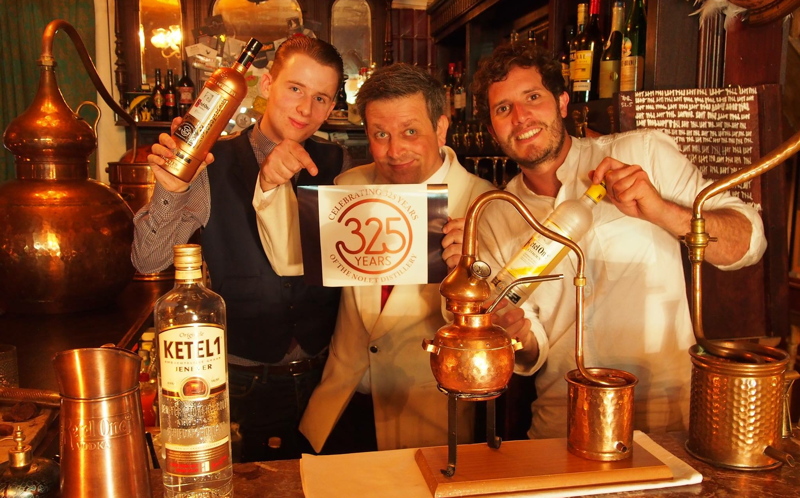
Gordon: So we’ve got two drinks here. I’ve got a Gibson, you’ve got a Dry Martini. So being UK best bartender for the year 2014 was it?
James: Yeah.
Gordon: What makes a really good Dry Martini and by virtue of putting a pickled onion in it, make it the best Gibson or is there something more to it?
James: I guess it’s down to the quality of the gin you are putting in and how it’s served. There’s a lot of elements to making a Martini and actually one of the last drinks I ever learned to make. Funny enough.
I was never classically cocktail trained. All my cocktails were based on flavours and playing with fruits and things. So I kind of approached it from a bit more of a chef side of things really. I took flavours and combined flavours whereas classic cocktails have been around for a long time and set recipes, but playing with vermouths and different gin types was something that wasn’t really there. I was just coming more from a flavour perspective.
I’ve always been really hot on local produce, but John Lister, a good friend of mine started teaching me about Martinis and their importance. It’s all about dilution and temperature is a massive thing and choosing a gin that kind of pushes through and really gives you the gin that you really want to taste. Then again with the Gibson quality onions and just delivering something that’s really balanced.
Gordon: My absolute pet hate is going somewhere where I’ve asked for a Dry Martini or a Gibson and they’ve given you the crappiest, mushiest olive from a High Street supermarket, and that’s just destroyed it. Or the pickled onions are like what you’d find in a fish and chip shop whilst the ones here at the Library are just superb.
James: It’s that extra level, all it is, is detail and concentration. I mean you can teach anyone to make a Martini, just give them the basic rules. It’s just respect for it .
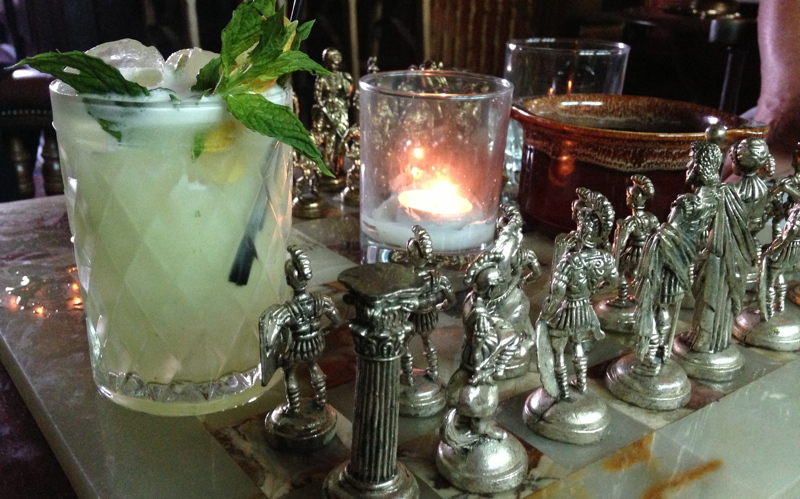
Gordon: So after Urban Beach came the Larder House. What made you think, you know what, I’m going to open up an eatery, because it’s a big step.
James: I’ve always had that drive to do something by myself. Working with the team, Mark was developing Urban, Urban Reef was open and that was kind of pushing forwards and I just kind of had that urge. I guess because when you’re around passionate people you didn’t realize what you’re more passionate about.
Gordon: Was it a case of you found a market for it or it was just something you wanted to do?
James: I opened the Larder House with two friends. Me, Quentin (Royles) and John (Lister). Quentin who is actually now the head chef of Urban Reef and was a former chef with me at Urban Beach. And a guy called John Lister who’s now doing really well in the drinks industry.
We wanted to open Larder House as a no booze place like a daytime funky bakery type thing where everything focused on wood burning, bread, coffees and we really wanted to put the booze side of things aside – because we’ve been around it for so long. That probably fell apart in the first week of planning it. When we started we saw a really nice wine rack and thought actually that would be really good. So then essentially we ended up building a restaurant.
We didn’t realize that until a week before we were open that it’s actually a restaurant and we’ve got beer and we’ve got everything that we wanted to do. And it took a good few years for us to establish it.
It was about, I guess stepping back in time a little bit and appreciating the pre-industrial attitude towards food and drink, finding products that have lost their way. Be it like sherries, absinthes and all those kind of classic drinks where you can go abroad now and they’re still drinking them. You kind of look and go, what’s that? Oh that’s, that’s what we do around here. That’s what we drink. So we wanted to put them back onto the British palate.
Gordon: When you first opened I popped in a few times and it felt like you were still finding your feet, but you weren’t scared of chopping and changing like any successful business has to do. You know what, this isn’t working and I need to do something different. What did you learn along the way?
James: A lot, you know, a lot personally and a lot in a business sense. We were definitely risk-takers in what we did. We were a massive curve ball, especially for Bournemouth. I always see Bournemouth as a place that’s a couple of years behind trend leading cities like London. We’re catching up now. We’re doing bits.
Gordon: Did you get a lot of early support though? Were people tuned in to what you were doing?
James: People were interested in what we were doing just because of the team that we had involved there. But we were definitely punching above our weight in terms of what we were putting out there. And a few things were a little bit ahead, over people’s heads in terms of what we were offering which was hard.
The first three years were really hard, like really, really, really hard then it hit a point where we people started realizing. I think it’s that word artisan, which we didn’t know at the time and it wasn’t thrown around, but a few years later, suddenly artisan and then a few years after that, McDonald’s started using the word artisan and the people getting clued up onto what the word means.
For us it’s just being really close to producers. The whole backbar down in Larder House, I pretty much have been to everywhere or know who makes every single product. I think that’s quite a cool thing because I’ve got the story about everything.
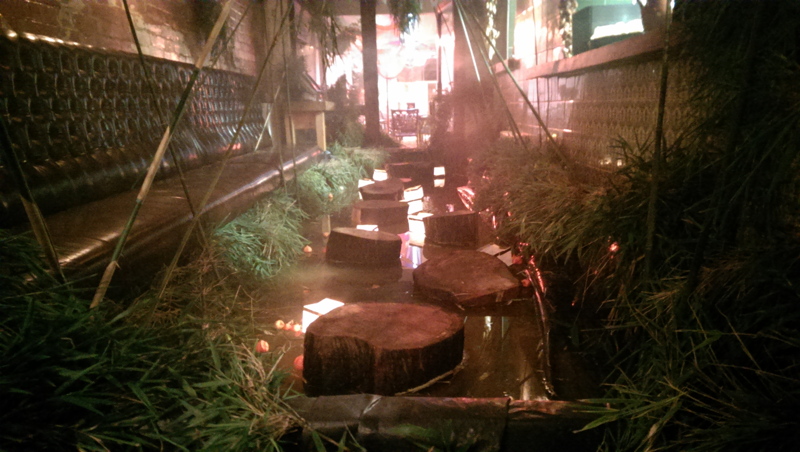
Gordon: At what point did it change from a kind of local establishment to something where people would travel because they heard the name? Was that before you became bartender of the year or afterwards?
James: I guess it ran about the same kind of time. We’re definitely massive foodies or massive drinkies if that’s a word. I think luckily because we’re not in the city, we’re not in London we can create our own trends.
I think we do create our own trends, even today. I think we inspire a lot of people, even in London and around the country, for things that we do. Just because we’re so involved with very localised food trends around Europe we are not scared to say, you know, let’s do that, let’s get on with that idea.
We know we’ve got great local support. The locals get behind it and it looks brilliant on social media. People go that looks brilliant fun. No one really knows what it’s about, but it’s just about having fun with food and drink and I think that’s what the industry is.
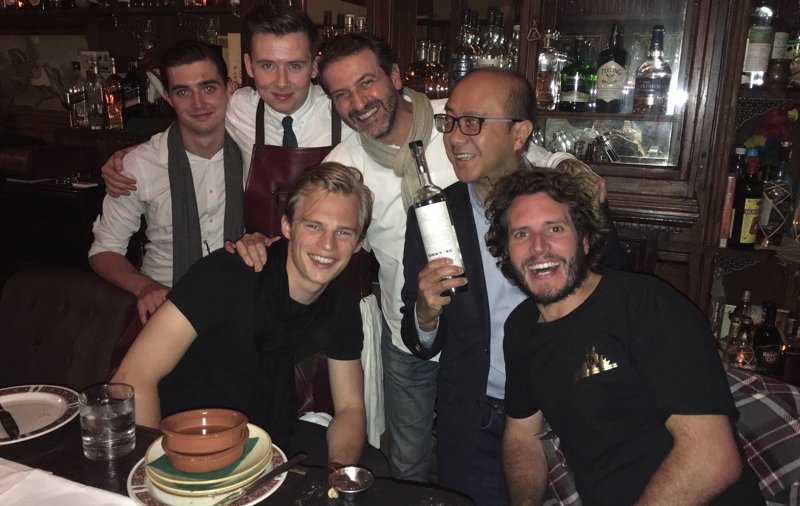
Gordon: So, you won UK World Class Bartender of the Year. Had you competed before then?
James: I did it the year before, I came fourth place.
Gordon: What did you learn and how did you prep for that?
James: I’ve always been big on supporting local bartenders and training local bartenders. Something I’ve actually slacked off recently and I’d like to get back into it as it’s about encouraging young people into the industry.
That particular year I was hosting a competition, and was the first year I entered. I was shocked by how bad and how poor people were. Just making simple mistakes and it really upset me because for someone who is so passionate about understanding what a product is and translating that into a drink, and talking about it and presenting it to really esteemed judges, I thought, you know what, I’m going to enter a drink and I’ll show you guys about it. And typically I won, in a localised one, then it kind of went from there really.
I didn’t want to enter it, I just felt that I needed to kind of show the area and prove to Bournemouth that we can actually, if you put your mind to it.
Gordon: But before that, had you been to London where people are wearing the white jackets and everything else and that kind of classical approach.
James: No, just being around people that love food and drink here. I’ve had some wicked bartenders here. John Lister, he’s the booze hound that started this place off. He taught me a hell of a lot but combine that with classic style cocktails with palates and food and drink, it’s not that hard to create new concepts and drinks. I guess all judges want to hear is a very good reason why you’ve given them that drink and a bit of passion and understanding and that I think that kind of set me through to it.
Gordon: For you to win was it a bit of a shock? Normally it’s the London bars, the hotel bars, the classic Savoys et cetera. So you turned up rocking up as a Dorset country bumpkin!
James: I was the first person outside of London to win it in a very long time.
Gordon: How did you prepare for that? Southbourne’s not the natural training ground. It can be quite intense to prepare X number of drinks in so many minutes.
James: Yeah, it is intense. When I won the UK one, we were flying to Hong Kong. There’s a few different rounds, one in London creating British classics, then creating a drink on the airplane at altitude, which adds all sorts of different elements to it.
Gordon: Was it your charisma, the story behind it all, the drinks, the flavours?
James: The final came in when I was judged by Jason Atherton in his bar in Hong Kong. The idea was to create a dish and for me to create a cocktail. So I wanted to create a cocktail based on that dish. So you tasted the dish, you went out to the wet markets and then chose the ingredients and came back. He said it was the best cocktail combination he’s ever tasted with his dish. That was like a big tick and that’s probably the reason why I did so well. But again, it’s just loving food and drink.
I think times have changed now and it’s got a lot harder in the bartending industry in terms of competitions. But back then the divide between the kitchen and the bar was massive. No one really thought about working with chefs. There was a divide, you’ve got your kitchen team and you’ve got your bar team. They’re not fussed on what they do and they’re not fussed on what they do.
The Larder House is all about that collaboration between the two. Going to a table saying you should have this cocktail with this and that. It was all about the experience. I’m talking about food and drink, food is as important as drink.
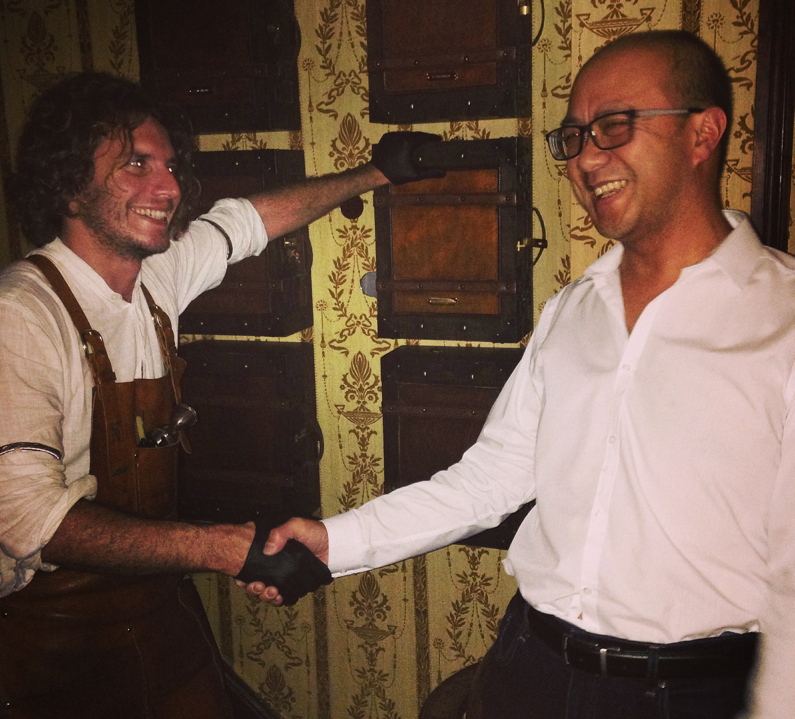
Gordon: So how did the Library of Liquor come about?
James: So that was three years after opening the Larder House. It used to be staff accommodation and I was thinking what do we do? I had some really good bartenders, Bournemouth’s best bartenders working for us in the restaurant.
Gordon: Was it because you wanted to retain the bartenders or something that you had in the back of your mind?
James: To retain and to respect them really. I was going to turn it into a preparation space for them so they could get up here and then one day I saw on eBay the whole interior and all the wooden panels for 500 pounds, which I think is amazing.
Gordon: Tell us about the decor as there’s some history behind it all. You drove up in your van?
James: Yeah, I’m supposed to go to Middlesex to pick up most of it and then found out it was Middlesbrough, which is very different! I don’t know how far different it is as I wasn’t driving that day. I think I was sleeping in the cab.
Gordon: What point did you really find out?
James: I think I was getting screamed at by my friend Paul the plumber who was driving me up there to go and pick up. We took out an old gentleman snug so he actually had to prise every piece off and put it back in. But for 500 pounds for all the doors and all the panelling that you see in our bar now.
The bar came from Wales, small town called Aberfan where that disaster happened. I’m trying to remember the name of the pub, but it’s got a bit of a dark history to it but that pub was about to be torn down and turned into flats I guess. So we pulled the bar out of there and if you research the pub unfortunately there’s pictures of miners crying round it after this disaster that happened back in the 60s. But at least it’s got a new lease of life.
The whole thing was a restoration project really from eBay and the whole reason we did it was for the respect of the bartenders that we had. They were really good and I didn’t want them just working in a restaurant bar where they don’t really get to engage with customers. So I thought, let’s create a space where they can show what they can actually do.
Gordon: There was a lot of mystery behind the bar when you first opened, because I don’t think you talked too much about it, so people thought it was a gentleman’s bar or some other dodgy kind of secret members where you need to apply.
James: We’ve never actually done any of that kind of stuff but I like that secretive side of things. Customers still come today, living in Southbourne and never knowing about the Library. I just didn’t want to push it as the speakeasy scene, I was probably again ahead of our time.
Speakeasy bars in London were a big thing and I think we just wanted that kind of feel for me. I mean it’s an awesome bar, and it’s an awesome restaurant, but when you are down there (in the Larder House) and you can say, do you guys want to come upstairs for a drink? You put them through a creaky little door, up a really bad looking staircase and they don’t know where they’re going. And then they can walk up and turn into a very kind of decadent, gentleman study-esque kind of place and gets served really fine cocktails. I think that’s quite a nice little addition to the restaurant.
We built it because we were too small downstairs. Everyone was waiting to come in and we had nowhere to give them pre-drinks or after dinner drink. So it works really well.
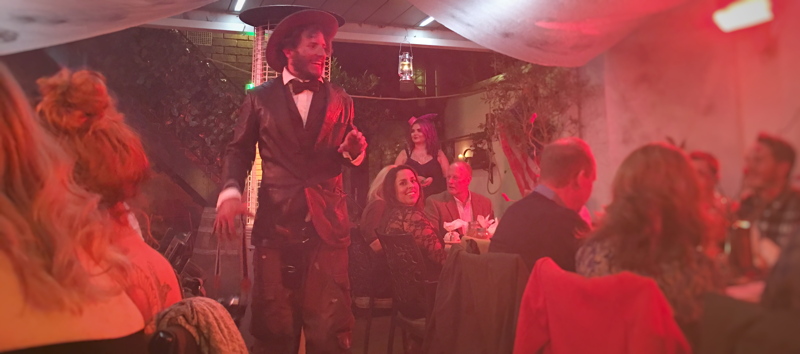
Gordon: So I know back in history, I used to harangue you about expanding, expanding, but you started with a small restaurant. You expanded into the courtyard, which was mostly a firepit as the first expansion, then expanded it again with the glass fronted covered area. You then expanded upstairs to the Library and I remember one New Year’s Eve I said James, I’m sick of hearing all these other people expanding into this place, that place, across the country in multiple places. I said this next year, I want to hear about what you are doing and how you can expand and lo and behold, Terroir Tapas came. How did that came about?
James: It all comes down to crediting team that we have. The first few years were really hard. I worked my absolute ass off. Then we got really great team and which we still have now, which gave us an opportunity and gave me time to think like what do we need next? And I think with every developing team you need to keep the model going.
I wasn’t big on a massive expansion plan to kind of go, go crazy and do things without the team that I trust. I think we’ve done it very organically and what we’re doing now is using the same team but opening new little doors. I had some great people around me and I thought, you know what, let’s open something inspired by what I love in London. Bars like Barrafina, like a high paced kind of tapas bar.
People were really interested in fast food with a bit more sociable angle. The Larder House is sociable, but it’s formal at certain times, especially in the evenings. So I wanted a big long bar where people could see the chefs cooking and bartenders creating drinks straight through.
So, I’ve got the venue and thought, you know, if we’re going to build a new venue in a very clean space, we’ve now got an opportunity to do something very environmentally friendly. When we took on the Larder House it was a bit of a beast, but now we’ve got a clean show and maybe let’s build it in the most environmentally friendly way that we can because it’s right to do that. So that’s why Terroir was formed.
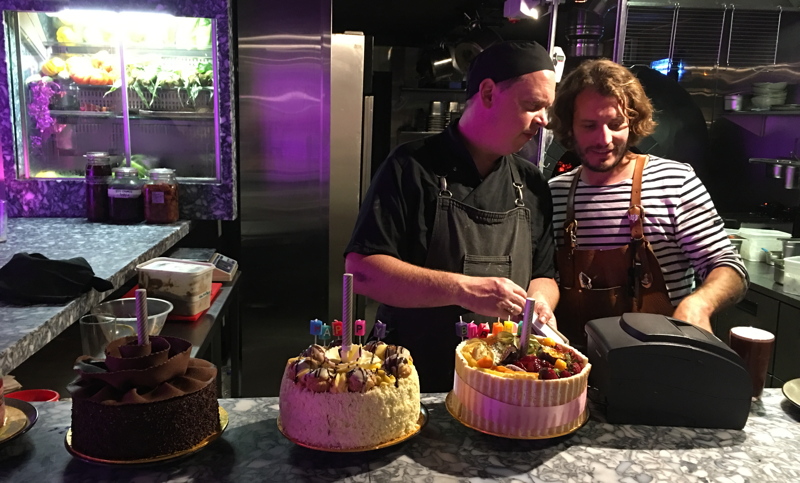
Gordon: A lot of people talk about sustainability in a way just to tick the box. What was your thinking behind it and what does sustainability mean to you in a deeper level?
James: Sustainability was a big thing a good few years ago. About 10 years ago, people were talking about like the likes of the MSC and all that kind of sourcing locally. I think that got taken completely adrift. There’s too many food menus out there now where people say they’re sourcing locally or doing things that they’re not actually doing.
My take on sustainability is all about reducing waste, getting the freshest, best ingredients as possible, showcasing them in the most simplest way and not over producing them. We’re not spending a lot of kitchen time, we’re just busy working in the quickest way to make them taste as good as they can. Like asparagus, it tastes amazing. If you them take out a field that day, eat them fresh, it’s great. Leave it in a fridge for a couple of days it doesn’t taste nowhere near the same way.
I live on the farm and that was kind of like one lucky way that I managed to and my wife to persuade me to live there so I can actually pick it up and deliver it to the restaurant and make sure that everything tastes as good as it should do. It’s a lot of critical control, just making sure that every point we check the quality and we have a lot of fun with it. The newest thing in sustainability is all about the team and mental health.
Gordon: Sustainability is not about getting rid of a single use straws. There’s much more than that.
James: There’s more, it’s looking after your team. We’ve changed our team hours quite a lot. I work really closely with our management team to make sure that we look after the people as much as we can, trying to change the old trends where chefs are working like crazy hours, six days a week. It’s a struggle, but it’s really motivating.
Gordon: I’ve mentioned to other people that you’ve really kind of invested in the high street, a bit like Rick Stein and his Padstow. Was that a conscious, brilliant business decision or could you not be bothered to venture out?
James: Southbourne is lovely. It’s great. I love Southbourne. I just think it’s a high street that is diverse. Larder House isn’t here for everyone, same way that Terroir isn’t here for everyone. There’s some wicked, absolutely great places on the whole high street and places that are here for some people and not for others. I think it’s about appreciating getting a whole diverse high street, same as how London’s diverse everywhere.
I wanted to stick to one high street and move between venues. I think it’s really refreshing for me that I could work from one place to the next place. Could I roll the Larder House out? People always ask me.
Gordon: I keep on asking you about Ashley Cross and Ringwood…
James: I don’t know. It’s too much of my heart in one place. I’ve heard too many stories where people go “second one is not as good as the first one” and that would kill me.
Gordon: And the fact that you can stand here, you can look over all of your businesses literary from the pavement, and think, actually I need to send two people down there, I need to bring another person up here. You can manage it dynamically and just get the best out of everything as opposed to thinking, oh there’s a problem 35 miles away. I need to drive up and try and sort that out.
James: Everything’s a fresh concept as well and think it’s really important.
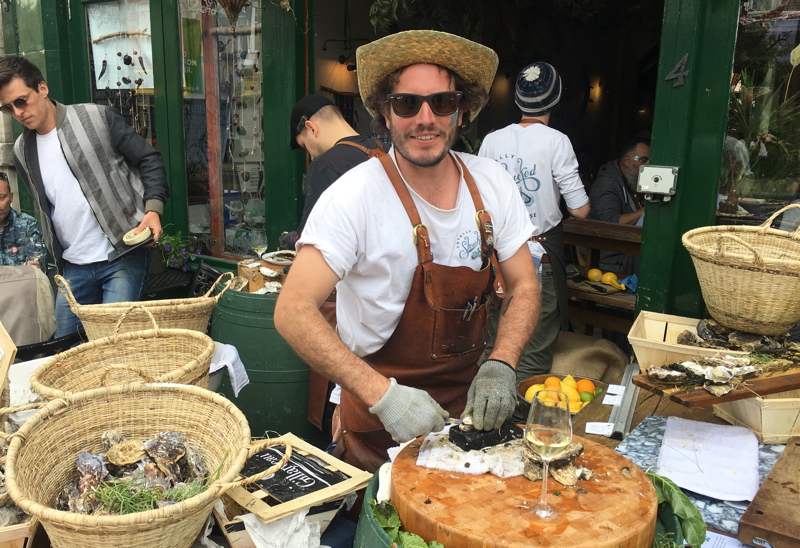
Gordon: So when it comes to the other businesses, I know for a fact you’re a big supporter of the High Street, independent businesses, even holding music events around here. So what does a high street mean to you?
James: It needs vibrancy. I think the high street needs to look alive. Different to other places. I rarely go into the town centre. There’s a few local towns, but I think it’s, again, Southbourne has developed and developed and developed and then we’ve got a really great sense of community. I’ll walk along, go from one restaurant to the next. It’s about a minute walk between the two and every shopfront, whoever’s in that shopfront will give you a nod and a smile.
Gordon: That’s because you’ve taken the time to get involved, in clearing the paths of ice when needed, driving around in your four by four when the Beast from the East was here, taking people to hospital and back. So community is about everybody putting in.
James: Maybe we talk about Word of Mouth, which was probably one of the best things. There’s competition, obviously there’s competition, but as competition we could still work together.
Gordon: You can compete locally but actually Southbourne needs to compete against Charminster, Winton etc etc.
James: So yeah, we can do that by working together.
Gordon: And then we can compete as Dorset against Hampshire.
James: There are great places to drink up the road, you know, which I get jealous of because they were really busy at some time. But I love drinking there as I know the next day they’re drinking down here and it’s so cool. Anyone would do whatever they can to help people out, which is the main thing.
Gordon: So, coming to your new baby, although I have to say congratulations on the real baby coming soon with Megan, but I want to talk here about your cheesy meats baby. What can you say about that?
James: So, we’ve got new premises across the road from Larder House. Every year for the last five years I’ve been keen on selling cheese.
Gordon: How much did you sell last year? I’ve heard half a tonne.
James: It was a whole tonne, if not more by the end.
Gordon: How many weeks?
James: We only did 13 days, so it was a lot. I literally had to stop selling on the last day because we needed the cheese to get for us through Christmas until the suppliers could supply. So yeah, last five years I’ve always had a little cheese stall at the front is kind of my thing.
It’s just a nice opportunity for me to sell at the front of the restaurant and talk to the locals and for people to buy cheese, come inside, have a mulled wine and mince pie. I think it’s just that Christmas kind of spirit, and for me that is Christmas now. That’s built into my Christmas routine.
The queues are get really long and what I can’t do anymore is the two hours set up and the two hours closed down and the wind that we get down the high street. I just generally get a bit battered by Christmas Day. I’m generally asleep cause it’s too much. So, we thought of the idea of getting a shop and the shop came up across the road and we thought, you know, let’s put a cheese shop, an all year round cheese shop in there.
Then a good friend of mine, James Golding, from The Pig Hotel, expressed an interest and then we’re kind of working together. He represents “A Pinch of Salt“, which is a charcuterie company.
So we are basically going to have a cheese shop one side of the room and a charcuterie shop the other side selling charcuterie from around Europe as well. So cured meats and things. Then at the back we’ve got a cheese-making facility and the aim of that is we will be making Southbourne’s first cheese, which I think is great because so many local people are making things. I mean, you’ve got Conker Gin, doing the best local gin you can get, we’ve the Outback Bar making Southbourne’s best beers. I was like, let’s start making cheese because I’ve got some really great dairies and I’ve always been a massive advocate of the dairy industry and the farming industry.
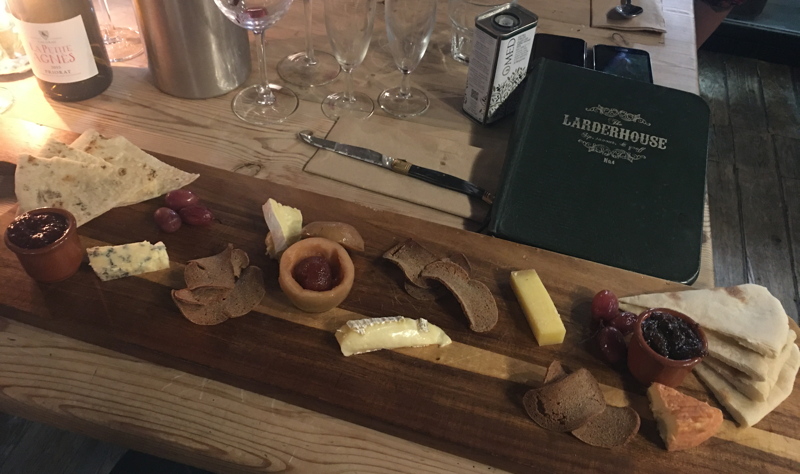
Gordon: So what kind of cheeses? Hard cheese, soft cheese, goats cheese?
James: Probably more softer, fresher kind of things. When you go to Europe on the markets, you get these kinds of really soft styles, like they might be two days old or two weeks old, four weeks old. We’re going to play. We’re going to have an absolute playground but that’s where we’re going to start with.
The whole idea is that you’d be able to come in for a cheese making course. You will make your cheese. We will age your cheese downstairs in our cheese cellar.
If you are planning a big party in Southbourne and then you’re going to be able to pull out your own Southbourne cheese, Southbourne gin and Southbourne beer. You can say this is Southbourne cheese that I made a few weeks ago and these guys have aged it for me. Who else can do that?
Gordon: Amazing! That’s a real celebration of the High Street.
James: Exactly. We don’t have a dairy around here, but we’ve got Meggy Moo’s dairy in Dorset and we’ve got new forest fresh goats’ supplier and we can make some really, really cool stuff. We can wrap cheeses in different botanicals like waste products from different people like Conker Spirit. We can work with them to do a Conker Gin style cheese and I guess a bit zippier flavours and things. It’s exciting. We’ve got a lot of work to do.
Gordon: So what kind of cheese can we expect for this Christmas? Are you going to import because you’ve done Norwegian cheese, French cheeses…?
James: Last year I had 110 different cheeses. This year we’ll probably do the same.
Gordon: What was your bestseller? But you must have sold everything.
James: Yeah, we sold a lot of everything. Brie de Meaux always sells really well. Black Bomber was a massive ask-for. People love their strong Cheddar. Westcombe proper farmhouse style cheddars do really well and obviously Dorset Blue Vinny is a big one for us. We do a lot of that. This year we’re not going to start making cheese until the new year. I’ve got a baby on the way as has James, so we’re going to try to focus on that in the New Year. That’s something to look forward to in 2020.
Gordon: So when can we expect the cheesy meats and truffle tour?
James: Hopefully November time.
Gordon: Okay. Just in time for the big big massive rush.
James: It will be open pretty much Monday to Saturday and we’re changing the hours a bit. We’re not going to be that nine till five kind of shop, we want to open a bit later to a bit later.
Gordon: Oh that’s good. Will there be events as well, tasting nights? Or is that for later in the New Year?
James: We can do, Friday, Saturday nights we might license it but the big idea is the late night shopping thing. I think people’s trends in buying are changing quite a lot now. So you can come to us and you can still buy your cheese at seven o’clock at night. I just want people to be able to get access to really good cheese. I’ve heard it too often in the years about people buying cheap cheese from the supermarket, wrapped in all that plastic but all dried out. Where if you get it fresh, I mean we get all the cheeses all fresh from like Rungis in France, all the bries and things. We’re cutting off from whole pieces of cheese and it makes a massive difference in terms of flavour.
Gordon: Well thank you for that James. I’ve got a final few questions, which kind of go back in history a little bit. You did a massive road trip from Land’s End to John o’ Groats. Why did you do that, was it a bit of fun, banter with friends?
James: This was for one of my World Class cocktail competitions. It was all about representing where you came from. So, I developed a drink basically using ingredients all the way from Cornwall all the way to John o’ Groats. We finished in John o’ Groats with whiskey, and this was a whiskey based cocktail.
Gordon: How many days did it take?
James: We did it in three days. I mean we whipped through really fast, but it was like driving from here, down to there to get Cornish sea salt. Spend the night down there with friends and then went up to the Cotswolds and got some nice raw milk. Then kind of picked up on Dundee cake and whiskey and things.
It was a road trip cocktail essentially. It was good fun. Super proud of it. Yeah, it was great.
That’s what World Class competition kind of cocktails expect, is that extra journey. The same way that I walked from my home in Sopley to Christchurch yesterday and just walking along, there’s so much stuff around us that we can use. Hawthorne berries. I found fresh hops growing on Christchurch bypass on the bridge.
I was amazed and I was literally creating cocktails as I was walking in for an hour. And that’s kind of what I do, just try to put fresh ideas into people’s glasses and plates.
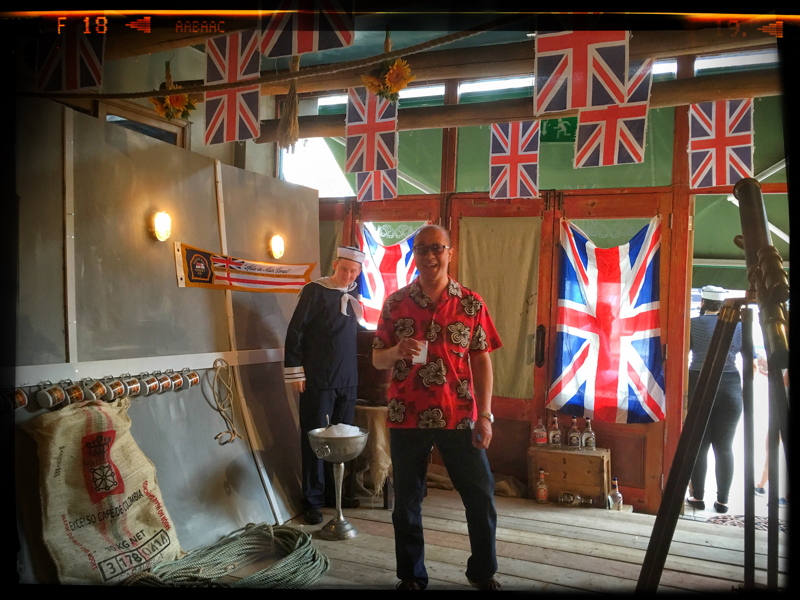
Gordon: One thing that maybe people haven’t experienced because it’s kind of tailed off are the legendary Larder House theme nights like the Whisky Night and the Gin Night. Why did you want to put those on, how do they come about and what was your favourite one as well?
James: Favourite one? Those big showcase nights, we might do one again, I don’t know.
Gordon: I loved them, and I understand the business thinking behind maybe he’s not doing them because it is quite all consuming, but it’s that all-consuming, immersive experience as a punter, that just made it just the best thing ever.
James: I think they were very good value for money.
Gordon: Yeah. Six cocktails and a lot of food for like whatever pounds.
James: And I guess it comes down to that really, because we just couldn’t afford to do that.
Gordon: But there was just nobody else ever doing anything like that.
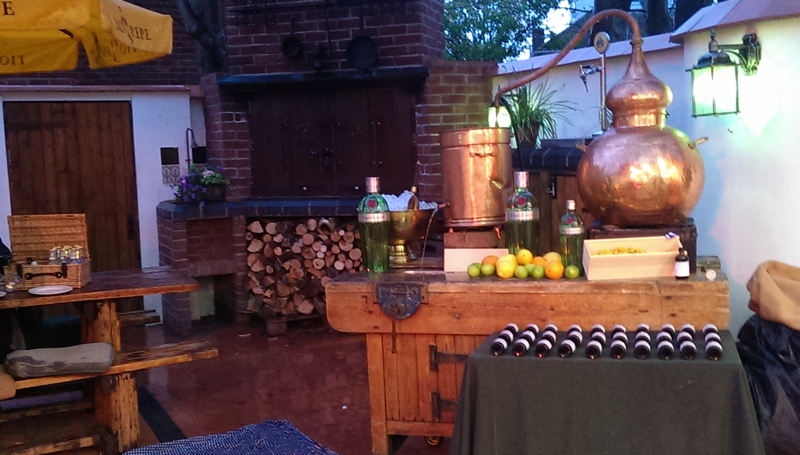
James: I did talk to Bournemouth Council about replicating them. I’d love to do it again and maybe it’s something that we should look at again. The whisky night where we flooded the restaurant and put a walk-in pond Japanese garden. The rum night where we had a real rocking boat inside. That’s my love for understanding products so you get that real experience, on the Gin Night where he set up Gin Lane in the front. The Gin Fountain as well.
Real immersive customer experience. I think that’s what customers want these days because customers know more and more about products. They know more and more about new gins. I’ve always said we hear more about new gins from people across the bar than we know ourselves. But people are really interested.
People have been interested in food. Look at TV, there’s more food and drink programs than there has ever been. We need to be the guys pushing that forward. There’s a lot more nights that we should do for sure.
Gordon: Maybe with a new place you can do that without affecting trade.
James: We can probably bring him back soon. It was a full on, I’d like to say theatre production. I mean they’re absolute fun. The team love them and it’s bizarre, it’s weird, it’s a lot of work, it’s risky, but they’re brilliant.
Gordon: One final question. What would be your best night in, dinner night or whatever, in terms of your drinks, your food and the whole thing. What would you do at home?
James: It’s all about people really, a nice wide space where we can get as many people as we can. I love doing Christmas dinner here at Larder House and we normally invite where we used to invite a few local people in, a few, if you can call them waifs and strays. Just to celebrate the day with them and get that real community spirit. The ideal meal, I’d like to say it’d be two days long because a day never seems long enough.
Gordon: Well what would you have by yourself?
James: This is like a final dinner? Starter would have to be a Prawn Cocktail. That guilty pleasure of mine is prawn cocktail. Main course, my mom’s Lasagne, can’t touch it. Then dessert, a Creme Caramel, that’s my three dishes.
Gordon: Thank you James for an interesting evening of drinks and chat.
